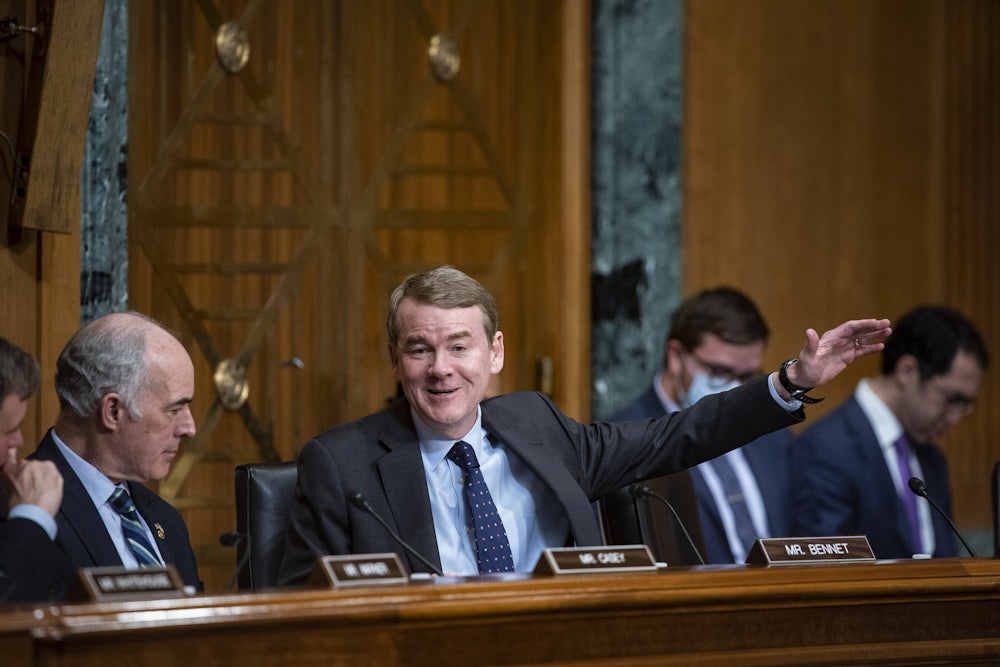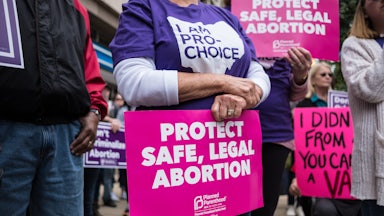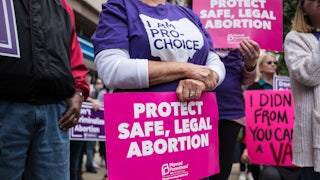Senator Michael Bennet wants people to remember that the child tax credit has, historically, not been a controversial program. The Democrat from Colorado is scheduled to chair a subcommittee hearing on Thursday morning focused on the credit’s history, and looking at how Congress could perhaps reach consensus on expanding it once more.
“My hope is … that we can restore the bipartisan effort that has undergirded the child tax credit over the years,” Bennet told me on Wednesday, ahead of the hearing by the Subcommittee on Taxation and IRS Oversight. “I have heard Republicans talk about their desire to expand the child tax credit. And that gives me hope that we’re going to find a bipartisan path to do it.”
For the majority of the quarter century that it has been on the books, the child tax credit has enjoyed significant support from both parties. After it was first implemented in 1997, Congress repeatedly increased and expanded the credit to assist more families, under administrations and congressional majorities of both parties. But the bipartisan bonhomie on the issue shifted in 2017, when Republicans narrowly passed massive tax cut legislation promoted by President Donald Trump. Although the measure doubled the amount of the credit to $2,000, and made it refundable for up to $1,400, the overall bill was opposed by Democrats who balked at the provisions which primarily benefited wealthier Americans.
Four years later, Democrats single-handedly passed a dramatic expansion of the credit as part of their gargantuan coronavirus relief package, the American Rescue Plan Act. President Joe Biden then touted the benefits of the enhanced credit on the campaign trail, which expired at the end of 2021, and so the policy became more associated with Democrats. The fact that Republicans not only opposed the overall bill, but also the specific provision granting full refundability for the expanded child tax credit, only cemented the perception.
Thursday’s hearing, highlighting the credit’s bipartisan history, may be an opportunity to help cooler heads prevail. “Both sides want to support families with children, and it’s a matter of finding some common ground in how we go about doing that,” said Katherine Michelmore, an associate professor of public policy at the University of Michigan and one of the witnesses Democrats have summoned to testify.
Even so, Democrats—led by Bennet—will still tout the results of the expanded child tax credit. In the six months that it was in effect, from July through December of 2021, the credit reached more than 60 million children. Because the refundability made the credit newly available to households too poor to pay income taxes, it also helped lift more than three million children out of poverty. Since it lapsed, the effects have been just as tangible: Michelmore told me in an email that “the current credit leaves out millions of the poorest children in the U.S. who stand to gain the most from the credit.”
But Republicans argued that allowing the poorest Americans to access the credit would discourage them from working. Kevin Corinth, the deputy director of the Center on Opportunity and Social Mobility at the American Enterprise Institute and one of the witnesses called by Republicans, co-authored a 2021 study which projected that a permanent implementation of the child tax credit as expanded by the American Rescue Plan would result in 1.5 million people leaving the workforce.
Although research has shown that the implementation of the expanded credit had minimal impact on the workforce, Corinth contended in an interview that “it’s hard to generalize from that six-month policy change in the midst of the pandemic to what would happen if this was extended in more normal times.” Parents may have been less likely to quit their jobs in July of 2021, Corinth argued, than they would be in 2023.
However, research from other countries which have implemented similar child allowances has shown that such programs have limited impact on work. One study from September 2021 also found that eight in 10 American families who benefited from the full refundability provision of the expanded tax credit had a current or recent worker.
Bennet told me that he did not believe that providing families with roughly an additional $10 per day would lead parents to quit their jobs. (The expanded credit provided $3,600 for children under age 6, and $3,000 for children ages 6 through 17 in households earning under a certain threshold, and was disbursed in monthly checks.)
“I do think there is the chance to revisit assumptions that have been made about full refundability,” Bennet said. He added that many Republicans also understood that it can be hard for grandparents raising their grandchildren or for parents with children under the age of 2 to work, meaning that a refundable tax credit could be helpful for caregivers who need to stay home.
Indeed, the idea of a child tax credit has long been salient for Republicans as a pro-family policy. The child tax credit was first proposed by a report from the bipartisan National Commission on Children, which was established by Congress and many of whose members were appointed by President Ronald Reagan. Former House Speaker Newt Gingrich’s 1994 Contract with America, the blueprint for much of modern conservative policy, included a $500 child tax credit.
Senator John Thune, the GOP ranking member of the subcommittee, noted to me that “there’s been a tremendous amount of Republican support” for the child tax credit, although not for the pandemic-era expansion. “A number of our guys got it expanded significantly from where it started,” Thune said about the 2017 tax cuts.
Nevertheless, Corinth said that the entrenchment of political perspectives could be an impediment to future bipartisan progress on the issue once more. “I could see there being ways where both sides would agree on increasing the maximum amount, maybe phasing it more quickly, or maybe phasing it in the first dollar of earnings instead of the two-thousand-five-hundred-and-first dollar of earnings,” Corinth said. “But I’m not sure what’s going to happen, given the very strong split on the earnings requirement.”
That split was evident in the days leading up to the hearing. Thune told me that he did not believe there was GOP support for reinstating the credit as it was expanded by the American Rescue Plan Act. Meanwhile, Senator Elizabeth Warren, another Democratic member of the subcommittee, told me that she believed Republicans wanted to “change the subject” from the impact of the expanded child tax credit to a discussion of work requirements.
“One of the things I expect to talk about in that hearing is how work requirements are a ruse for just tangling more people in red tape and denying benefits to those who desperately need it,” Warren said.
Even given these political differences, Bennet is holding out hope that discussing the history of the credit—as well as the impact of the 2021 expansion—will light a fire under lawmakers from both parties to get serious about the future of the policy. That conversation may soon gain more urgency: As House Republicans mull their own tax package this year, Democrats are now trying to figure out how to include the child tax credit as part of potential negotiations.
“We’ve seen what it has meant for kids all across America, and I hope that creates the basis for a bipartisan evolution and a greater bipartisan ambition for what we can do with the child tax credit,” Bennet said.










